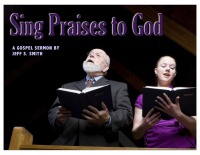Sing Praises to God
 Tuesday, March 20, 2012 at 10:50AM
Tuesday, March 20, 2012 at 10:50AM One of the most distinctive things about churches of Christ is the music. When made by spirit-filled worshipers, its a Cappella quality resonates with meaning unimpeded by innovation and instrumentation. We must always be careful that the focus of our musical worship is not wholly shifted to the mechanics of eschewing the instrument, but is concentrated upon the words of the hymns and the work of giving our best to a worthy God.
its a Cappella quality resonates with meaning unimpeded by innovation and instrumentation. We must always be careful that the focus of our musical worship is not wholly shifted to the mechanics of eschewing the instrument, but is concentrated upon the words of the hymns and the work of giving our best to a worthy God.
Discussion
I. Musical Praise
A. Shout to God
1. musical praise is an old practice, certainly predating the church (Psalm 47:1-9)
2. the psalmist’s point is that God is deserving of our praise and of our best
3. if he could be convinced of that before the cross, it should be even clearer after it
B. Old Testament Worship
1. it is clear from the practice of David, from temple worship, and from the psalms, that Old Testament worship included many instruments of music
2. that fact has been used as evidence that the church should use them as well, but to the contrary, their abrupt absence from the New Testament suggests a renewed interest in intelligible lyrics rather than meaningless, though pretty, sounds (First Corinthians 14:13-17)
3. had God desired to continue the tradition of instrumental music in worship, he could have commanded the church to play, or inspired the apostles to provide examples in their worship, but he did not
4. the church’s worship is not merely a reproduction of temple worship, but a spiritualized improvement – the scent of burning incense is replaced by the launching of faithful prayers, the burning of animal flesh is replaced by the cross and its commemoration in the Lord’s Supper, a temporary Mosaic covenant is superseded by the preaching of the New Testament, the tithe is replaced by a freewill offering, and singing emerges from the cloak of “lifeless instruments” (see First Corinthians 14:7)
C. New Testament Worship
1. everywhere in the New Testament church, the focus of worship is on meaning and explanation; emotion is not authority in itself, but flows from the reasonableness of faith
2. it is vital that we learn to employ our hearts in worshiping God, even as we sing songs that are familiar or sometimes poetically mysterious in some ways (Ephesians 5:15-21)
3. Jesus, his disciples, the apostles, and the early church sang their praises to a worthy God, maintaining mobility and readiness wherever they were and not settling into complacency or dependence upon machinery or hired entertainers to perform their worship for them
4. worship must be a personal activity and a human one (Hebrews 13:14-16)
II. Worship
A. Singing With Thankfulness
1. if we put too much emphasis on the mechanics of musical worship – the absence of an instrument or chorus – we can easily get complacent about the personal aspects of praise
2. we are simply trying to satisfy some requirement that we get six songs into every worship service; we are trying to give voice to the gratitude boiling up in our hearts (Colossians 3:14-17)
3. boredom, preoccupation, bitterness, hatred, doubt, selfishness, and many other attitudes can chip away at the tone of our hymns – even if the notes sound right to human ears, they lack harmony to a God who judges the sounds according to the heart making them
B. Singing With Purity
1. we sing, then, not only with thankfulness, but with purity of purpose; “He who loves purity of heart, and whose speech is gracious, will have the king as his friend” (Proverbs 22:11).
2. our songs should be consistent with our own thinking; otherwise they are musical acts of deceit and hypocrisy
3. when the lazy sing about work, when the skeptic sings about Heaven, when the bitter sings about love, purity of purpose is surely missing from worship
4. purity in the words of worship is consistent with the attitudes of everyday life: “by purity, knowledge, patience, kindness, the Holy Spirit, genuine love; by truthful speech, and the power of God” (Second Corinthians 6:6-7).
C. Singing With Cheer
1. there are times when singing is difficult because of circumstances – ill health for one, but emotional anxiety as well; “Is anyone among you suffering? Let him pray. Is anyone cheerful? Let him sing praise” (James 5:13).
2. regardless of circumstances, we strive to be a joyful people, our souls “satisfied as with fat and rich food” so that our mouths are ready to praise him with joyful lips (Psalm 63:5)
3. times of grief might not allow for much joyous singing, but our goal should be a perspective on life that makes for more contentment than misery, and our worship should reflect that
Conclusion
Do not be satisfied that the mechanics of worship are in tact, that no instruments have been used in the production of our praise. The heart itself is an essential element of true praise, and each heart must strive for purity and purpose throughout.
Questions for Review
- What does it mean to worship in spirit and truth?
- Which matters more – spirit or truth? Explain.
- How does worship differ between the testaments.
- What organ is essential to proper worship?
- How can thankful singing benefit us?
- How can our singing benefit others?
- What makes it hard to sing with cheer at times?
 Jeff Smith
Jeff Smith


